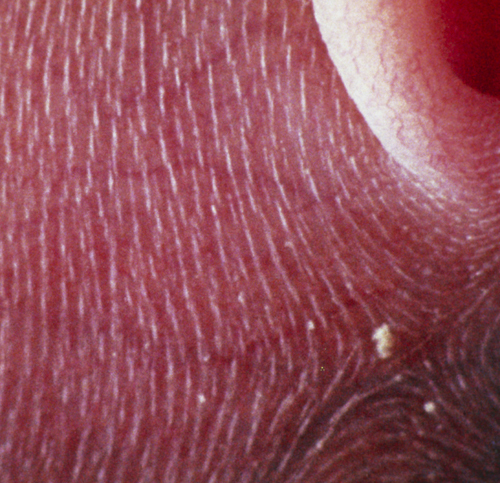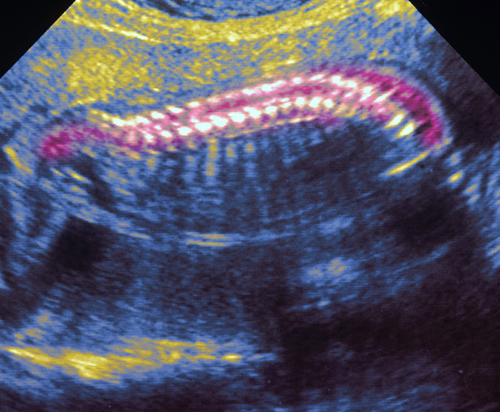You are 21 Weeks and 6 Days 127 days to go…
Your baby has been filtering amniotic fluid and storing the waste as a substance called meconium.
Your baby today
This is a close-up of the baby’s skin just behind the ear. Every
part of the skin’s surface has small ridges and hollows in a unique
pattern. During this week the dermal ridges—the deeper layers of
skin—start to mature, giving rise to finger- and toeprints.

At the end of this week,
your baby’s anal sphincter muscle is fully functional. This should
prevent any small particles of meconium from being passed into the
amniotic fluid. Meconium is first produced at 12 weeks. It is the
somewhat greenish/black first poop that nine out of 10 newborn babies
pass in the first 24 hours.
Meconium is formed
mainly from cells discarded from the lining of the gut as it lengthens
and expands, and the waste of any nutrients which have been absorbed
from the swallowed amniotic fluid. It is continuously produced, slowly
moving down the gut to enter the large bowel (colon) by 16 weeks.
Meconium is sterile since there are no organisms inside the gut and no
bowel gas is produced.
The unborn baby will move her hand to her mouth and even suck her thumb.
Research has shown that
the baby may even open her mouth in anticipation. Anything that the
hands encounter is firmly grasped and this grip is strong enough to
support all of the baby’s body weight.
Keep toned
Effective strength training during pregnancy, using free weights (see image)
or a machine at your gym, will help your body deal with the demands of
pregnancy. Being stronger will help you carry the increase in body
weight and also help you recover after the baby is born. Having more
toned limbs will help you look and feel better, too.
Like all aspects of exercise during pregnancy, there are guidelines that should be followed:
If you’ve been doing regular weight training, continue with your program, but do not increase the weight loads or repetitions.
If you’re new to using weights,
begin with very light ones and few repetitions and build up slowly. Do
not increase the weight load until you are confident that you are able
to manage the increase.
Take a deep breath to start and breathe out as you lift the weight.
Free weights,
rather than machines, are safer to use during pregnancy. If you’re
using a machine, make sure a trainer has shown you how to use it
correctly.
If you find standing up while doing strength training too tiring, sit on a chair to lift your weights (see image).
If you’re sitting and using weights,
keep your back straight and relax your shoulders. When standing, make
sure that you have your legs hip-width apart and your knees slightly
bent.

You are 22 Weeks Exactly 126 days to go…
Maintaining a professional manner at work will set the standard for how colleagues treat you during pregnancy.
Your baby today
The vertebrae that make up your baby’s spinal column encircle
and protect the spinal cord. The vertebrae are seen here on an
ultrasound scan, forming a long chain (white areas) that narrows at the
base of the spine and ends with a slight outward curve.

Chances are that everyone in your office
will be aware that you are expecting a baby by this stage, even if you
haven’t told them personally. Good news does have a habit of traveling
fast, and you may have that pregnancy “glow” that makes your condition
pretty clear—as well as a fairly prominent belly.
If word of your
pregnancy is getting around the office, it might be best to tell your
boss now. It’s always better and more professional if your boss hears
this news before other people in your company.
You may need to adapt
your working day a little, but play it carefully. Try to keep up with
your work, and act professionally. Your colleagues are, hopefully,
thrilled that you’re pregnant, but try not to expect special favors or
extra attention.
While being pregnant
isn’t an illness, do take adequate breaks to recharge your batteries, or
work flexible hours, if that’s an option, so that you can avoid
traveling at the busiest times.
Try to go for a short
walk on your lunch hour for fresh air and to get some gentle exercise.
Drink plenty of water to keep you hydrated and alert, and eat little and
often to keep your energy levels high.
Make sure people judge you on your work and not on the fact that you’re pregnant.

… Health
Vaginal bleeding
If you have any vaginal bleeding, always see your doctor. Growths on your cervix, or some inflammation, can produce light bleeding from time to time.
Heavy bleeding in the second trimester may suggest a problem with your placenta, such as placenta previa (see Low-lying placenta).
Similarly, the placenta may pull away from the wall of the uterus,
causing some bleeding, or, very rarely, uterine rupture can occur,
usually only in women who have had a cesarean section in the past.
… Doctor
| Q: |
My manager said I can’t have time off to go to my prenatal doctor appointments. What should I do?
|
| A: |
You’ll be spending a lot of time at the doctor’s office for
prenatal care during the next several months—every 4 weeks now, but as
frequently as once a week at the end of your pregnancy. If you also work
full-time, it’s a good idea to schedule your prenatal appointments for
the early morning, before you begin work, or during your lunch hour. If
your appointments tend to run long or your doctor’s office is far from
work and your boss isn’t understanding, ask if you should use your sick
leave or your vacation time for the hours that you’ll be away from the
office.
|